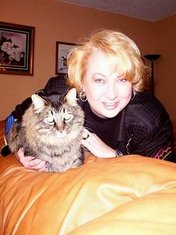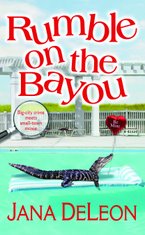So there's buzz all over the industry about high concept. Do you have it - got to have it - better get it if you want to sell. And they're not lying. High concept is necessary for a sale, particularly in the single title market place.
So why then, is it that something that's so important can hardly be explained?
I've been to workshops, read articles and listened to people talk about high concept. I still don't have a good way to explain it to anyone else. I write high concept and I know it when the idea comes or when I read it in anyone else's work, but I can't define it.
For people who write on a professional level, you think we'd have a good way of communicating something so important to our industry. But I don't have the words.
What about you? Do you understand high concept? Can you explain it in a couple of sentences? I'd love to hear them if you can.
Monday, October 09, 2006
Subscribe to:
Post Comments (Atom)
Musings of a Louisiana Liar

Everyone knows what "they" say about opinions, but we all have one anyway so why not publish it - right? Welcome to my somewhat limited and sarcastic view of the world.
About Me
- Jana DeLeon
- Married, three dogs, three cats, one brain cell remaining......
Coming October 30, 2007

UNLUCKY
My debut!

RT Book Reviews TOP PICK!
Blogs I Read
Blog Archive
-
▼
2006
(157)
-
▼
October
(23)
- Why I Don't Have to Make Up Characters
- Louisiana Revisited
- Traveling Friday
- Suicidal Bunnies
- Posting Bail
- The Best of the Best
- The Weekend CliffNotes
- Busy Weekend Ahead
- The Bathroom Wars
- Courtroom Drama
- Why Some Men Will Never Have It Good
- Monday Movie Review
- Payment for Services Rendered
- Houston, We Have Wal-Mart Sightings
- myspace
- Movies on a Plane
- Got High Concept
- TGIF!!!
- Finally - Another Sale!!!!!!!!!
- Day After Release Day
- OFFICIAL RELEASE DAY!!!!
- Likes Books
- A Surreal Moment
-
▼
October
(23)
13 comments:
For me, high concept is best described as a story that can be summarized in a single sentence.
For example: A student at a top-secret spy school falls for a normal boy who can never know the truth about her.
The key to high concept is clear conflict. If you're a sleezy lawyer who can't tell lies for a whole day (Liar, Liar), that's obviously going to cause problems.
If you're a normal teenage girl who finds out you're also the sole heir to the throne of a small European country (Princess Diaries), that's got some obvious drama.
A lot of these stories have basic themes--coming of age, struggling to find yourself, etc. But there is an external driver for the internal conflict.
Take Rocky for example: No-name fighter gets shot at heavyweight title. That's the "high" concept, but the story is actually about Rocky proving to himself and others that he really is someone that matters. The concept simply shows the steps Rocky is going to take--the hoops he's going to have to jump through--to do it.
hope that makes sense,
Ally
Thanks, Ally! Those are great examples and very easy to follow!
I think Ally has some great examples.
Another way I've heard high-concept described is by using two or three well-known ideas/concepts to describe your work.
For example, when I pitched my "Buffy the Vampire Slayer in Jane Austen time period" book--it's pretty clear what the general kind of story it is, and what kinds of things to expect. It at least gives you the sense of time and place, and what the conflicts might be.
Same with my "erotic Phantom of the Opera"--everyone knows the story of the Phantom, but this describes a new twist to the story.
You can also use high concept to come up with an idea. Take two high concept ideas and put them together: Star Wars meets Little House on the Prairie. (I dunno, I just made that up--but already people get an idea of what the story would be about.)
Hope this makes sense.
High concept is just a clever way to pique someone's interest in a new way. Like with Colleen, when I heard Buffy meets Jane Austen my first thought as a writer was I wish I'd thought of that. My second reaction as a reader was, "Ooh yeah, I'm totally buying that book."
Anyway, the HC pitch for the book I'm querying right now is: My Fair Lady with fangs. That sentence alone got me two full requests.
You can see people's eyes light up and they sit up straighter. It shows your concept is marketable and interesting without having to give a five or ten sentence explanation. In one sentence you've grabbed the person's attention and they automatically understand the premise and tone of the book.
It's about briefly encapsulating your conflict or premise in a way that makes me do a double-take. But your idea has to lend itself to this method. I've heard people trying to force high concept and it's painful.
Whent hat "using other stories to describe yours" works, it works well. But that's not what high concept is. It's just a particular method to describe soemthing that is ALREADY high concept. Colleen's story described as a vampire slayer in regency England is every bit as high concept as "buffy meets jane austen."
High concept is the kind of story that can be easily undertood from a few words and promises commercial appeal. It doesn't matter what the words are.
All great comments, but I still have a problem - I can't seem to describe Rumble in a couple of sentences, but yet everyone says it's high concept.
Anyone who's read it - feel free to help because I'm at a loss.
What about "Laura Croft in a Jeff Foxworthy nightmare."
I started RUMBLE last night and I'm totally loving it.
I've always had a bit of trouble with the whole, um, concept of High Concept. My critique group pals assure me some of my ideas are High Concept, but describing them as such is a whole other story. :)
Hi Tori - I'm so glad you've loving Rumble! Maybe you and I suffer from the same "high-concept description deficiency?"
Hey Diana...thanks for clarifying. I always thought high concept usually meant using already-known entities.
Jana, I'm still thinking on it.
Back when I started writing screenplays, Jana, I heard somewhere that, for high concept, you should be able to describe your story as a _____ who _______s. Now, I admit, I haven't landed a copy of Rumble...yet...but I rather imagine you could just fill in the blanks and have it.
One problem I think people run into is they think they need to include every subplot, every character, every ounce of conflict. You don't. It's the MAIN conflict--what I like to call the center of the story.
In fact, I've gotten so spoiled by working with high concepts, that I really struggle to write when I don't know what that center of the story is. That's how I know what stays and what goes. If it doesn't advance the main plot, if it doesn't tie to that central struggle in some way, then I'm going to cut it.
good luck!
Ally
Rumble is VERY high concept.
A big city DEA agent on the trail of a druglord matches wits with a sexy bayou sheriff who calls all the shots in her hometown, a place with more gators than people.
I've also been calling it Doc Hollywood with gators and DEA agents... you know, when i recommend it to everyone I know!
Ally - I'll have to think on those blanks and see if I can fill them in.
Thanks, Diana - I think that's a great description! And big hugs for recommended it to everyone. Lubs ya!
Post a Comment